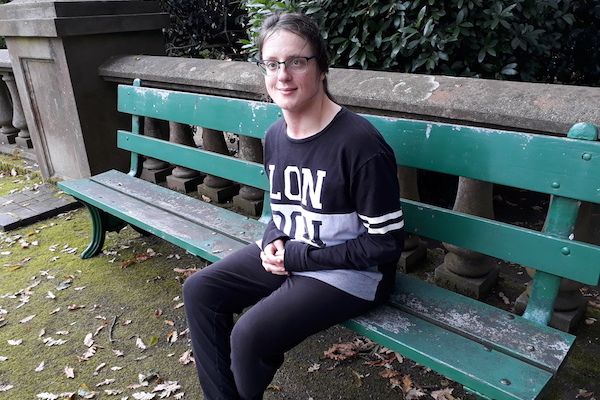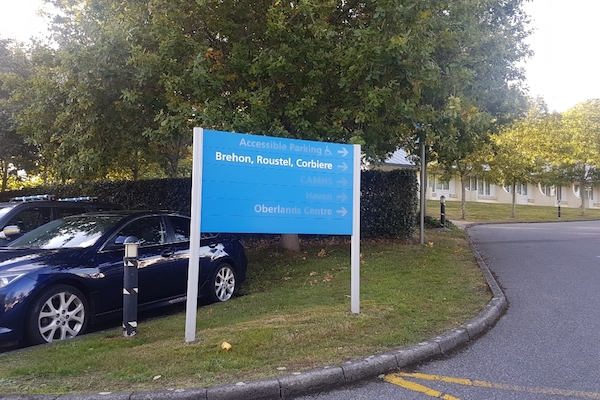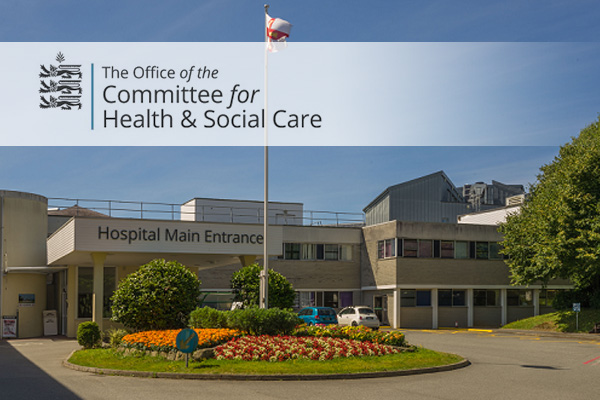

A woman who said she had bad experiences under Guernsey's mental health system is asking for government officials to listen to her and others who feel they have suffered.
Emily Nuttall, 25, was first under the care of local mental health services when she was just eleven years old.
However she says her experiences since being transferred to adult care have not been good and she wants the States to introduce more protocols to ensure patients are not 'abandoned' by the system.
Ms Nuttall said: “We need the government to act, those people who have had poor experiences and can provide evidence we need the government to look at that and look at the information that people are providing and actually sit down with these people, sit down with all of us, in a room and say actually this needs to be improved and see the people that are actually struggling with losing people from the system and then they should realise that not everything is what it should be and they need to put in a plan.”
The Committee for Health and Social Care has already instigated a review of mental health services, although it's not clear when any information from it will be released.
Ms Nuttall said she is concerned there are 'too many tragedies' in the island with individuals taking their own lives, and she feels more can and should be done to help them.
"I just feel some people are let down," said Ms Nuttall.

Pictured: The Oberlands Centre is now the focal point for mental health services in Guernsey.
Ms Nuttall, herself has experienced various different services under the local mental health care provision, including the Child and Adolescent Mental Health Service, the former Castel Hospital and the Oberlands facility.
Ms Nuttal said in her experiences, the services were better under the former Castel Hospital, than at the Oberlands.
“When it was at the Castel before we went to this brand new sparkly building I had a bit of a better service there, the building itself wasn’t great but I had regular support from a mental health nurse and I saw a psychiatrist every few weeks and it was more consistent, and I went into Albecq ward on a few brief occasions for my mental health after a suicide attempt on several occasions.”
However, Ms Nuttall said, since then, in her opinion, services have not been as good.
“There were some people that at the start were really helpful but unfortunately as time went on I didn’t have that consistency there were just different people coming from different services within the building and it just didn’t work for me and they thought because I looked well I was ok, but they have to understand that even though someone may look ok you don’t know what they are feeling and how they are suffering and I think its making people realise that actually you cannot judge a book by its cover.
"For me personally when we transitioned to the Oberlands it was not a great transition, when we were in the Castel the building was falling apart around us but there was consistent services and there was consistent support. This bright new building, it seems the whole system cannot cope with the change and starts to collapse around everybody."
She argues that the processing system for people in mental health 'crises' is not good enough and has some ideas on how it could be improved.
"When you present yourself to A and E there should be a law that you are assessed there and then by a phyciatrist. Because they do come out and assess but they don’t always intervene like they should.”
Pictured: Guernsey's Emergency Department at the Princess Elizabeth Hospital.
Ms Nuttall said she felt "abandoned" by the Mental Health service and has taken it upon herself to become a champion for others who she feels have also been let down by the system.
“I do a lot of work with Guernsey Mind. I volunteer there and I am doing a lot of mental health champion work. We are trying to break that stigma that it is ok to talk about it and Guernsey Mind do a phenomenal job with awareness and campaigns and training. They are really trying to get out there that we can support each other, but it's trying to make the services listen to that and realise that they have to help people in this community with their mental health.”
She has some messages for those both suffering with mental illness and those trying to assist those sufferers: "it's ok not to be ok, but it is really important that everyone talks. If you cannot talk to a family member or doctor then there are helplines, it's about reaching out and making people realise they can find help elsewhere.
“The states of Guernsey need to sit down and look at the strategy and they could work with charities and agencies. When I have been suicidal in the past and made suicide attempts the mental health services say there is nothing we can do, the government need to say then that actually you have a protocol to follow. We have got to have something in place that you are assessed and you are supported because that is so important that everyone has fair and equal treatment support and care within the system.”
“Don’t be afraid to reach out – keep a journal – get things out on paper, don’t let the pressure cooker build up inside. Even if you cannot share things face to face, write it down and rip it up or be creative.”
To support her calls for better mental health services, Ms Nuttall has launched a petition, which is being shared on social media.

Pictured: Guernsey's PEH which is the centre of health services in the island.
The Committee for Health and Social Care said while it is difficult to discuss individual cases and claims, it was able to issue a statement addressing some of Miss Nuttall's concerns.
HSC also wishes to remind people that a system is in place for anyone wishing to discuss their individual circumstances.
"We are sorry for those people who have contacted you to express their dissatisfaction with the service they have received. HSC would like to remind people that our Customer Care Team is there to help them should they need it. They can be contacted on 725241 or by email customercare@gov.gg."
The committee with responsibility for the island's health and social care, acknowledged the use of social media for airing grievances, which it said is not always helpful.
"It is difficult for HSC to respond to individual claims made via the media and, in particular, social media. HSC is increasingly concerned that, whilst individuals airing their issues/concerns have a legitimate right to share their experiences, those commenting in response often post uninformed opinion which can cause other service users significant distress.
With regards the wider systems surround mental health care provision in the island, HSC said it is as important as mental health, but that some misunderstandings need clearing up.
"HSC is focussed on prevention and early intervention and considers mental health and wellbeing to be as important as physical health. It is important to differentiate between mental illness and mental health as these are terms that are often used interchangeably which is incorrect and unhelpful.
"Mental health (our mental well-being, emotions, thoughts and feelings) is something that every individual has and can impact on our ability to solve problems and overcome difficulties. Mental illness occurs in a quarter of people at some time in their life, at differing levels of severity, with only the most severe needing secondary mental health services. It would be untherapeutic on an individual and community level for all those with social difficulties to be seen as needing mental health services.
"The States as a whole has a responsibility to consider health and wellbeing in all Committee mandates. In addition, the Mental Health and Wellbeing Strategy is a cross-committee, cross-community strategy (led by HSC) which outlines how the community will work together to ensure appropriate and effective treatment is available for those that need it.
"Whilst HSC has made explicit a commitment to give mental health the same status as physical health in our Policy & Resource Plan submission, it is important to note that HSC is not the sole provider. In addition to the services provided by HSC, the Bailiwick receives services from private therapeutic services, charitable services and other associated third parties. Together, the care individuals seek or need is provided.
"The majority of mental health problems are appropriate for management within a Primary Care setting, with only the severe, complex and risk associated cases needing secondary care intervention.
"There is a breadth of mental health services provided in both primary and secondary care in Guernsey.
"The Primary Care Mental Health & Wellbeing Service (PCMHWS) offers a stepped care model of ‘low’ and ‘high’ intensity psychological services for adults of working age who present with mild to moderate mental health challenges.
"In addition to the services provided by the PCMHWS and other private providers of therapeutic services, HSC provides support for mental health conditions for both children and adults.
"In hours emergency cases, requiring services from the secondary mental care team, are seen on the same day. Out of hours presentations to the Emergency Department are seen by a specialist in an average of 46 minutes. Urgent cases are seen within the same week. Routine assessment referrals are offered an appointment within 4 weeks. Thereafter, if follow up is needed, individuals are seen at a frequency determined by their level of need.
"Guernsey has a lower rate of suicide than the UK/Jersey but every death by suicide is a tragedy. HSC is acutely aware that any suicide in such a small community has a significant impact. In such circumstances, if the individual concerned is under our care at the time of death or has had recent contact, an independent investigation takes place.
"It is worth noting that need does not always match desire, but it is the job of our service to provide therapeutic intervention, which is a balance between providing safe, supportive, evidenced based care, but also to promote resilience, encourage self-management and prevent dependence, which is counter-therapeutic and damaging in the longer term."
Pictured: Emily Nuttall.
Comments
Comments on this story express the views of the commentator only, not Bailiwick Publishing. We are unable to guarantee the accuracy of any of those comments.